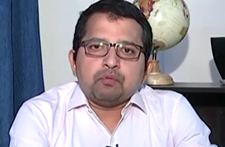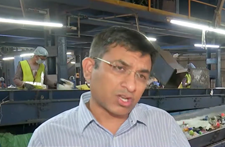
Finalist - Sujay Santra, iKure, Kolkata
With the inspirational dream of achieving zero mortality due to lack of primary healthcare in India, iKure has been working towards bringing quality, affordable, and accessible healthcare to the doorstep of communities for over a decade. iKure delivers primary healthcare, wellness & prevention services through innovative technology, trained frontline community health workers, a network of Hub & Spoke clinics with a focus on the continuum of care across rural, semi-urban as well urban settings.
Its doorstep community health workers are equipped with point-of-care (POC) devices, which enables them to provide monitoring and diagnostic support. In the geographical areas where it operates iKure offers wide-ranging health services packages, door-to-door consultation assisted telemedicine with appropriate referral and escalation, drugs and medical supplies, pathological tests, eye & dental tests, and spreads awareness among others. Through its proprietary software, Wireless Health Incident Monitoring System (WHIMS) iKure analyses patient information for health screening, early detection, and monitoring of diseases. It brings in data science and research capabilities to analyze collected data and find the root causes of ailments and addresses them holistically through a combination of health & hygiene, water & sanitation, nutrition, etc.
With its unique combination of technology intervention, skill development, and outreach initiatives iKure has served a population of over 10.2 million people in 5,200 villages across 7 states of India. With the belief in co-creation, it has created a unique ecosystem by partnering with local NGOs for onground mobilization, device partners for the latest technology, supply chain partners for consumables, hospitals for secondary & tertiary care and research organisations for clinical & technical knowhow of various ailments. Read more...

Finalist - Sandeep Patel, NEPRA, Ahmedabad
NEPRA endeavours to solve India’s dry waste management problem through its inclusive, transparent and tech-driven socio-business model. NEPRA’s waste managementservices spread pan-India include Environmental compliance Advisory, collection, waste processing & recycling by creating state of the art Material Recovery Facilities. NEPRA has been demolishing the challenges faced by the Indian waste management sector one by one through its simple strategy of ‘Innovate and Improvise’, NEPRA works with the motto of ‘Zero waste to landfill’.
NEPRA engages in city-level waste management services, ranging from awareness and collection of dry waste from several big & small waste generators to sorting (according to the type of waste), processing it at its mechanized Material Recovery Facilities (MRF) and finally recycling it. The waste processed into recyclable form is traded to recyclers to churn new products and non-recyclables are channeled for energy recovery. NEPRA’s model makes the informal sector workers (waste-pickers, sweepers, and other Bottom of the Economic Pyramid members) as one of its main stakeholders. It helps in organising the unorganised waste management sector and changes the way waste is collected and dumped through the use of technology like GPS, Facial Recognition making it more efficient and transparent. Through Facial recognition, NEPRA has helped create first of its kind database of the waste pickers in the cities where it operates. It has helped curb exploitation by ensuring fair and equal payment to waste pickers, who in turn are also trained and employed at NEPRA’s MRF facilities giving them economic security.
NEPRA has so far engaged with over 2000+ waste pickers. For multi-layered packaging, NERPA has it’s tie-ups with urban local bodies and upliftment of small waste management NGOs or start-ups in 18 states in India. In last one year, NEPRA has worked with 40 local Government authorities. In the last two years, NEPRA has successfully recycled 67108.93MT of dry waste. Read more...